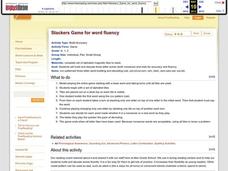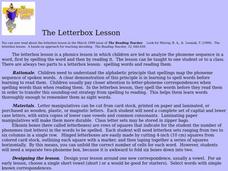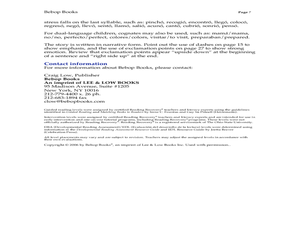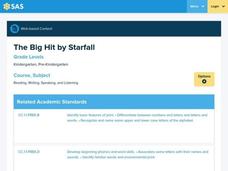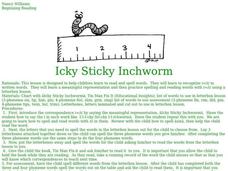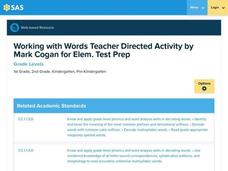Curated OER
Phonics: Read and Write Irregularly Spelled Words
Kids practice saying and identifying words that have irregular spellings. They consider the words said, come, and does by breaking them down into how they are commonly pronounced versus how they "should" be pronounced given their spelling.
Florida Center for Reading Research
Word Steps
Blending basic CVC letters to make words is one of the first steps to independent reading. Provided here are several images of stairs and several letters to cut and arrange. The learner rearranges the letters to form CVC patterns, sounds...
Meadows Center for Preventing Educational Risk, University of Texas at Austin
Lesson 12 - Ed Suffix with Unchanging Base Words
Understanding different verb tenses begins with knowing how to decode words. A lesson on the -ed suffix with unchanging base words introduces readers to the past tense. Teachers present the skill with oral reading and spelling...
Ohio Department of Education
Word Origins
Understanding a word's etymology can really help with decoding and building vocabulary skills. Readers compare and contrast words of similar origins but with different difficulty levels. They focus on prefixes, suffixes, and affixes....
Curated OER
Irregular Words Fluency, Speed Battle
Let's play a game! Explore language arts by participating in a flash card reading game. Kids utilize flash cards that have a number of irregular words written on them. They collaborate in pairs and compete as they attempt to pronounce...
Curated OER
Practicing Sight words
Review sight words with readers. They will look over their sight words and come up with sentences for each of them. They also review the alphabet and identify unfamiliar words.
Curated OER
Phonics: Decode and Write Words with the “Silent e”
What happens when I add an 'e' to the word mad? It becomes made! Decoding and writing words with the silent e is the instructional activity for today. The class discusses what the e can do to a cvc word, then they practice adding e's to...
Curated OER
Stackers Game for Word Fluency
Explore words by building and decoding three-letter words. Real or nonsense words can be formed with the alphabet tiles. Practice fluency and blending sounds with CVC patterns.
Curated OER
Phonics: Decode and Write Words
Sounding out individual phonemes and blending them to make a word is usually one of the first tasks mastered when learning to read. Make master decoders out of your learners, they sound out a series of simple two and three-letter cvc...
Curated OER
Phonics: Decode and Write Words with Blends
Kids see, say, then count the phonemes they hear in a series of simple words. They practice counting phonemes with the teacher, then sound out the same word on their own. As they count each phoneme they write it down on their paper. A...
Curated OER
Affix This
Wait, what am I supposed to affix? Explore the concept of roots/affixes with your class. They use discussion questions to discover the meaning and usage of specific roots and affixes. They watch a video explaining Latin and Greek roots...
Curated OER
The Letterbox Lesson
Students analyze phoneme sequence in a word. They spell words using phoneme analysis and read new words using phoneme analysis.
Curated OER
Guided Reading with Elizabeti's Doll
Practice reading strategies using Elizabeti's Doll by Stephanie Stuve-Bodeen. Readers utilize decoding and comprehension strategies before, during, and after reading the story. A detailed list of text features, high frequency words,...
Curated OER
Irregular Word Fluency, Smack the Wall
Students practice decoding irregular words. In this irregular word fluency lesson plan, students read the irregular words from the word wall. Students listen to the teacher read an irregular word and smack the word on the word wall with...
Curated OER
Making Words
Third graders spell words and define homophone. In this making words lesson, 3rd graders decipher words from letter strips in an effort to identify the "secret word". Students use a set of letters to spell different words.
Alabama Learning Exchange
Phonics lesson for -ew and -oo
First graders identify letters and sounds associated with -ew and -oo sounds. Each learner receives a stack of cards containing these sounds, and they must determine whether the word uses the -ew or the -oo sound. This could easily...
Curated OER
Animated Alphabet
Students explore English by completing an interactive language history activity. In this word recognition lesson, students discuss word formations and the phonetic relationship between letters. Students identify the origin of individual...
Curated OER
Tomato Exploration
Create tomatoes in 15-20 minutes using this fun and interactive lesson plan! Learners listen to a book about tomatoes (recommendations listed), and focus on the vocabulary word tomato. They count the syllables...
Curated OER
The Big Hit
Students are introduced to the phonetic sound associated with the short letter "i" and listen to a story which includes words with this sound. In this the big hit starfall lesson, students build sound letter accuracy. Students also...
Curated OER
Icky Sticky Inchworm
Use the meaningful example "Icky Sticky Inchworm" to demonstrate the /i/ sound. Then have learners take out letter boxes and spell simple words like six, lip, him, pin, slim, grin, etc.
Curated OER
Sound It Out!
Help your class improve their spelling skills. Learners take a test, are given a particular spelling rule to practice, and play a Bingo game. This employs various methods for practicing spelling skills.
Pennsylvania Department of Education
Working with Words Teacher Directed Activity by Mark Cogan for Elem. Test Prep
Students build word families. In this interactive language arts activity, students visit a website where they play a game creating word families. Students may print out their work when finished.
Curated OER
Word Recognition
Students recognize and spell color and shape words. In this color and shape words lesson plan, students reinforce their vocabulary and spelling skills.
Alabama Learning Exchange
Phonics lesson for -ick family
Kindergarteners and first graders develop phonemic awareness for words that contain -ick. Each learner gets a stack of cards with different -ick words, highlighting the target sound as they review each one.









